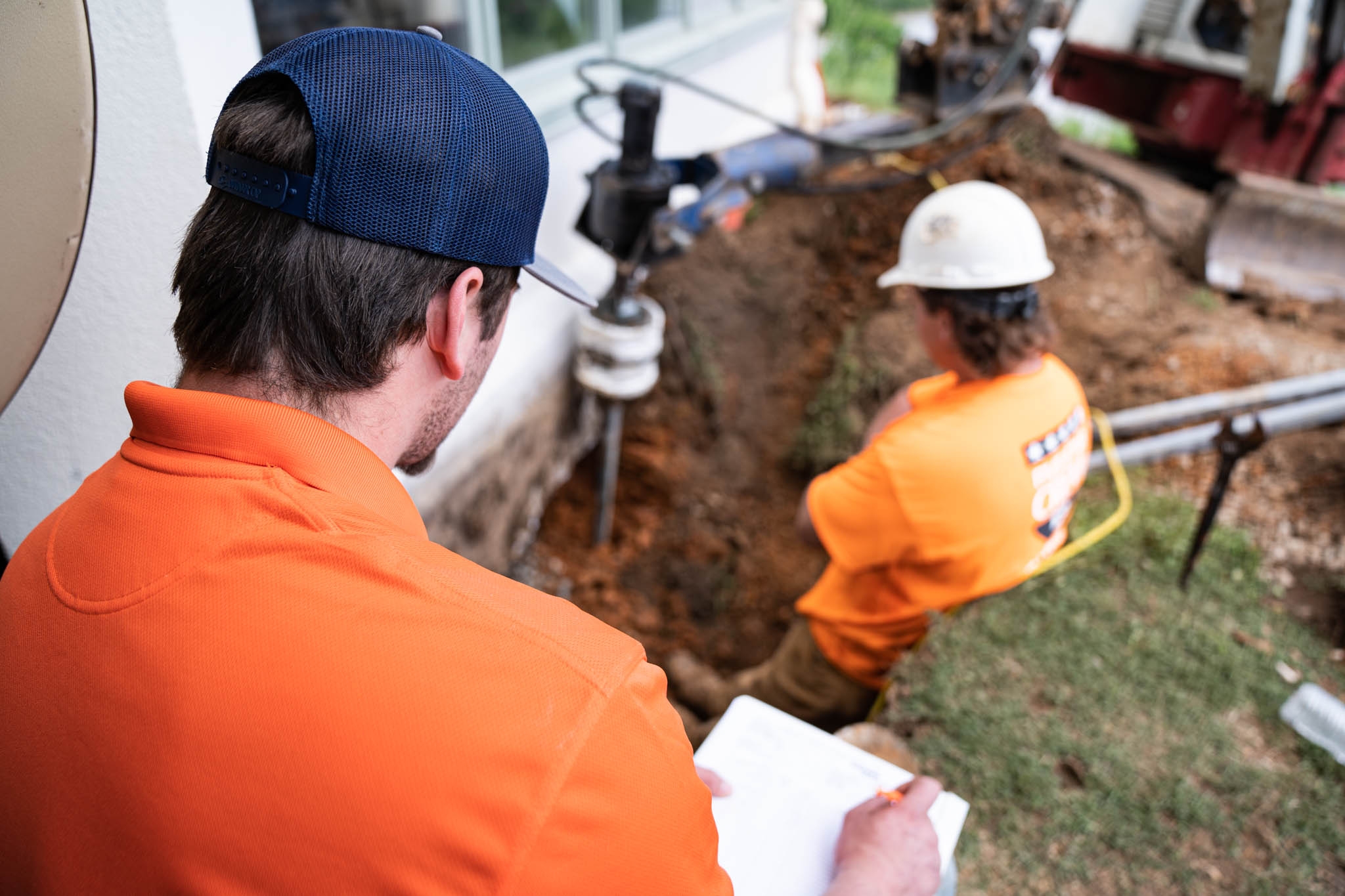58 Foundations: The Ultimate Guide To Building A Stronger Future
When you hear the term "58 foundations," you might think it's just a number or a random concept. But hold your horses, because these foundations represent more than meets the eye. They are the building blocks of progress, stability, and growth across various industries and communities. Whether you're a business owner, a student, or simply someone curious about the world, understanding these foundations is crucial for shaping a better tomorrow. So, buckle up and let's dive into what makes these 58 foundations so important.
Think of foundations as the backbone of any structure—physical or metaphorical. In the world of development, whether it's construction, education, healthcare, or technology, having a solid foundation is key to long-term success. And guess what? There are 58 of these critical elements that play a massive role in shaping the world we live in today.
This article isn't just about listing 58 random things; it's about diving deep into why they matter and how they impact our daily lives. From environmental sustainability to economic growth, these foundations touch every aspect of modern society. So, whether you're looking to expand your knowledge or find practical solutions, we've got you covered.
- Glenn Danzig Height A Deep Dive Into The Iconic Musicians Physical Presence
- Rowdy Gaines And Riley Gaines Swimming Legends And Their Impact On Sports
What Are the 58 Foundations?
Let's start by breaking down what these 58 foundations actually are. These aren't just random ideas thrown together; they're carefully curated principles that have been developed over time through research, trial, and error. Each foundation serves a unique purpose, whether it's supporting infrastructure, fostering innovation, or ensuring social equity.
Picture this: you're building a house. You wouldn't just throw up walls without laying a proper foundation, right? The same logic applies here. These 58 foundations act as the pillars that hold everything together, from businesses to communities to entire nations. By understanding them, you can build stronger, more resilient systems that benefit everyone involved.
Why Are They Important?
Okay, so we know what the 58 foundations are, but why do they matter? The answer is simple: without them, everything falls apart. Imagine a world where there are no established guidelines for ethical business practices, no focus on environmental sustainability, or no emphasis on community development. It would be chaos, plain and simple.
- They promote stability and consistency.
- They ensure fair and equitable practices.
- They drive innovation and progress.
- They provide a framework for solving complex problems.
These foundations aren't just about ticking boxes; they're about creating meaningful change that lasts. They empower individuals and organizations to think critically, act responsibly, and work collaboratively toward a shared vision of the future.
Top 10 Key Foundations to Focus On
Now that we've established the importance of these foundations, let's zoom in on the top 10 that deserve your attention. These aren't just random picks; they're the heavy hitters that have the most significant impact on global development. So, grab a snack and get ready to learn!
#1: Environmental Sustainability
In a world where climate change is a growing concern, environmental sustainability is more important than ever. This foundation emphasizes the need to protect our planet's natural resources while still supporting economic growth. It's all about finding that sweet spot where progress doesn't come at the expense of the environment.
Did you know that according to the United Nations, we only have about 11 years left to make significant changes before the effects of climate change become irreversible? Yikes. That's why this foundation is so crucial—it's not just about saving trees; it's about saving ourselves.
#2: Economic Growth
Let's talk money. Economic growth is another key foundation that impacts every aspect of society. It's not just about making more cash; it's about creating jobs, reducing poverty, and improving overall quality of life. When economies thrive, communities thrive.
According to the World Bank, countries that prioritize sustainable economic growth tend to have higher levels of happiness and well-being among their citizens. Who wouldn't want that?
#3: Social Equity
Social equity is all about fairness and justice. This foundation focuses on ensuring that everyone, regardless of their background or circumstances, has access to the same opportunities and resources. It's about leveling the playing field and giving people a chance to succeed.
Research shows that societies with higher levels of social equity tend to be more stable and prosperous. Makes sense, right? When everyone has a fair shot, the whole community benefits.
6 Sub-Foundations You Need to Know
Alright, let's break it down even further. Within the 58 foundations, there are several sub-foundations that deserve special attention. These are the building blocks within the building blocks, if you will. Here are six that you need to know:
#1: Education and Learning
Education is the key to unlocking human potential. This sub-foundation focuses on providing quality education to everyone, regardless of where they live or what their circumstances are. It's about empowering people with the knowledge and skills they need to succeed in an ever-changing world.
Fun fact: countries that invest heavily in education tend to have higher GDPs and lower unemployment rates. Go figure.
#2: Healthcare and Well-being
Healthcare is another critical sub-foundation that affects everyone. It's not just about treating illnesses; it's about promoting overall well-being and preventing diseases before they start. When people are healthy, they're more productive and happier.
According to the World Health Organization, investing in healthcare infrastructure can lead to significant economic benefits. So, it's a win-win situation.
#3: Technology and Innovation
In today's digital age, technology plays a huge role in shaping our lives. This sub-foundation focuses on fostering innovation and leveraging technology to solve real-world problems. From artificial intelligence to renewable energy, the possibilities are endless.
Did you know that the global tech industry is projected to be worth over $5 trillion by 2025? That's a lot of zeros!
How to Apply These Foundations in Your Life
So, now that you know what these foundations are and why they matter, how can you apply them in your own life? The good news is, you don't have to be a world leader or a billionaire to make a difference. Small actions can have a big impact.
Here are a few ideas to get you started:
- Support local businesses that prioritize sustainability.
- Volunteer your time to organizations focused on social equity.
- Invest in your own education and skill development.
- Advocate for policies that promote economic growth and fairness.
Remember, change starts with you. By taking small steps today, you can help build a better tomorrow for everyone.
Case Studies: Real-World Examples
Talking about foundations is one thing, but seeing them in action is another. Let's take a look at a few real-world examples of how these foundations are making a difference:
Example #1: Tesla and Environmental Sustainability
Tesla is a prime example of a company that's putting environmental sustainability into practice. By focusing on electric vehicles and renewable energy solutions, they're helping to reduce carbon emissions and promote cleaner transportation options.
Since its inception, Tesla has sold over 3 million electric cars, proving that there's a huge demand for sustainable solutions in the automotive industry.
Example #2: Patagonia and Social Equity
Patagonia is another company that's walking the talk when it comes to social equity. They've made it their mission to support environmental and social justice causes, donating a portion of their profits to grassroots organizations.
Through their "1% for the Planet" initiative, Patagonia has contributed over $100 million to environmental causes worldwide. Now that's commitment!
Data and Statistics
Numbers don't lie, and when it comes to the 58 foundations, the data speaks for itself. Here are a few stats to chew on:
- 70% of global GDP is generated by countries that prioritize economic growth.
- Investments in education can increase a country's GDP by up to 20%.
- Renewable energy sources are expected to account for 50% of global electricity generation by 2030.
These numbers show just how powerful these foundations can be when applied correctly. They're not just theories; they're proven strategies for success.
Challenges and Solutions
Of course, implementing these foundations isn't always easy. There are challenges to overcome, from resistance to change to lack of resources. But with the right mindset and strategies, anything is possible.
Here are a few solutions to common challenges:
- Engage stakeholders early and often to build buy-in.
- Use data and evidence to make a compelling case for change.
- Start small and scale up as resources allow.
Remember, Rome wasn't built in a day. It takes time, effort, and collaboration to make lasting change happen.
Conclusion
And there you have it—the ultimate guide to the 58 foundations that are shaping our world. From environmental sustainability to social equity, these principles are the building blocks of progress and growth. By understanding and applying them, you can make a real difference in your own life and the lives of others.
So, what's next? Take action! Whether it's supporting sustainable businesses, volunteering your time, or investing in your own education, every little bit helps. Share this article with your friends, leave a comment, and let's keep the conversation going. Together, we can build a brighter, more sustainable future for everyone.
Table of Contents
- What Are the 58 Foundations?
- Why Are They Important?
- Top 10 Key Foundations to Focus On
- 6 Sub-Foundations You Need to Know
- How to Apply These Foundations in Your Life
- Case Studies: Real-World Examples
- Data and Statistics
- Challenges and Solutions
- Conclusion



Detail Author:
- Name : May Keebler
- Username : rohan.timmothy
- Email : beulah06@gmail.com
- Birthdate : 1975-03-12
- Address : 958 Murphy Villages Konopelskiland, MN 32219
- Phone : (240) 961-4342
- Company : Robel-Dibbert
- Job : Janitorial Supervisor
- Bio : Qui ut itaque id enim ut. Quia ut magni ut eos velit aperiam et. Animi quam similique quas laborum maiores iste.
Socials
linkedin:
- url : https://linkedin.com/in/vito2514
- username : vito2514
- bio : Harum quae accusantium dicta harum sint id.
- followers : 5155
- following : 1572
twitter:
- url : https://twitter.com/toyv
- username : toyv
- bio : Ullam numquam doloribus odit. Est sit amet et architecto quis. Nam error quibusdam ut iure enim. Debitis ratione eum repellat voluptas pariatur.
- followers : 5849
- following : 2275